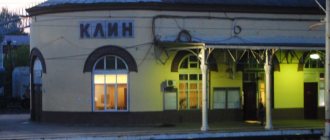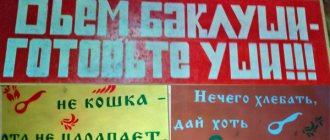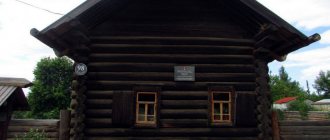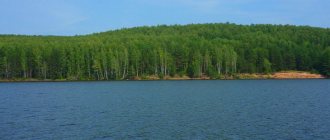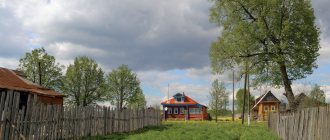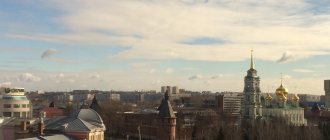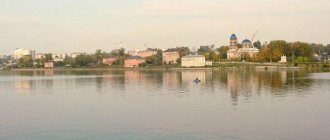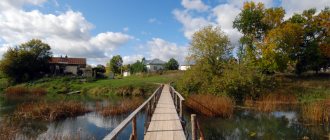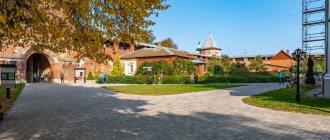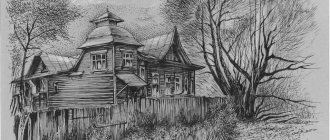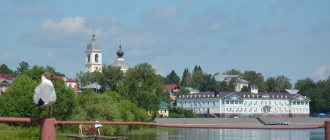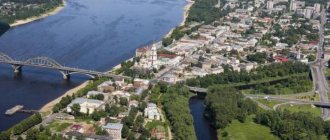The ancient city of Klin is best known for the fact that Pyotr Ilyich Tchaikovsky lived here in the last years of his life. The sights of Klin are also associated with other famous personalities - Arkady Gaidar, Mikhail Prishvin and others. In Klin there is a popular museum of Christmas decorations “Klinskoye Compound”.
A few facts about Klin
- The city of Klin is located on the Sestra River, 65 kilometers from the Moscow Ring Road. From the capital you can get here along the Leningradskoye Highway. Buses No. 437 to Klin depart from the Rechnoy Vokzal metro station.
- Trains run to Klin station from Leningradsky Station (you can also take trains to Tver and Konakovo State District Power Plant).
- The Klinsky district borders the Tver region in the north.
- The city's population is approximately 80 thousand people.
- Klin was first mentioned in 1317; it received city status in 1781.
- Klin is conveniently located on the road from St. Petersburg to Moscow. Under Peter I, a postal pit was built here.
- In 1851, the Nikolaev railway was built here.
- During the Great Patriotic War, the city was occupied by the Germans from November 23 to December 15, 1941.
- Klin is the city of Tchaikovsky. There are three monuments to the composer installed here: at the station - by sculptor Vera Mukhina, in the park near Sovetskaya Square - by sculptor Kh.B. Gevorkyan. and near the Tchaikovsky house-museum - a sculpture by A. Rozhnikov.
The significance of the city of Klin in the modern world
Today Klin is a developed industrial center of the Moscow region. The city administration pays great attention to the development of the infrastructure of the settlement. In recent years, the authorities have been able to make it especially cozy, clean and attractive for tourists.
The city was founded back in 1317. But who exactly is unknown. In 1482 the city was annexed to the principality of Ivan the Third. Then it lost its military significance, but did not become empty, but quickly became an important center of trade.
The name of the city also appeared for a reason. It arose because the new settlement became a kind of “wedge” during the period of feudal fragmentation of the country. It was considered the border between the Moscow and Tver principalities.
You can find out other important information about the city from the table:
| Intelligence | Characteristic |
| Square | 42 sq. km |
| Coordinates | 56.3317° N. W. 36.7216° E. d. |
| Population | 79 thousand people |
Sights of Klin
Postal yard
The sights of Klin are closely associated with many famous names who visited the city. Due to the fact that the city is located on the road from St. Petersburg to Moscow, many celebrities stopped here at the Postal Yard to change horses: Pushkin, Lermontov, Dostoevsky, Radishchev. Such figures as Leo Tolstoy and Maxim Gorky also came to Klin.
In the famous story “Journey from St. Petersburg to Moscow” by Radishchev, in the Klin chapter the action takes place in the postal yard. The postal yard in Klin has survived to this day. The Russian Post is located on the ground floor.
The city is also interesting for its architectural buildings, museums and cultural and historical buildings.
Assumption Church
The Church of the Assumption of the Blessed Virgin Mary is the oldest architectural structure in the city. Until the mid-18th century, it served as the cathedral of a convent.
In 1569, the guardsmen of Ivan the Terrible carried out reprisals against the residents of Klin following a denunciation of their treason. The result is destroyed and burned houses, dead people. According to one legend, the guardsmen were looking for the gold of the merchant Velyaminov from Novgorod, buried in an underground passage. However, their searches were unsuccessful.
In memory of the dead people, residents erected the Assumption Church in 1572
You can visit it today.
There are three versions about the creation of this church:
- Ivan the Terrible was overcome by repentance, and he allocated money for the construction of a church.
- The temple was built at the expense of the townspeople.
- The king allocated funds so that during his campaigns he would have a place to visit.
In the same temple, the future Emperor Peter I, the baby of Tsar Alexei Romanov, was baptized. Tchaikovsky attended services there.
The relics that have survived to this day are the icons of Sergius of Radonezh and the Tikhvin Mother of God.
The church was restored in 1962-1967 with donations from a Belgian princess who came to see the Tchaikovsky Museum. However, believers received the temple only in 1992. A belfry was added next to it, since the previous one was blown up in 1931. It was re-consecrated in honor of Sergius of Radonezh, but many residents call it by its old name - Uspensky.
The church is located at Papivina Street, 16a.
House-Museum of P. I. Tchaikovsky
Website: tchaikovsky.house Address: st. Tchaikovskogo, 48. Opening hours: from 10.00 to 18.00 (ticket office until 17.00), days off: Wednesday, Thursday, last Monday of the month - sanitary day. Cost: 300 rubles, for schoolchildren, students, pensioners - 190 rubles.
The list of places included in the attractions of Klin opens with the house-museum of P. I. Tchaikovsky. It was created within the walls of the estate, which was rented by the great Russian composer from the justice of the peace V.S. Sakharov. Tchaikovsky was there for the last two years of his life. The museum appeared immediately after the death of P. I. Tchaikovsky in 1894. It was founded by the musician’s brother, Modest Ilyich Tchaikovsky.
It is the oldest Russian memorial music museum, a building of cultural heritage of the peoples of the Russian Federation. The decoration of the house was not lost, P. I. Tchaikovsky’s personal belongings, sheet music, and library were left. The funds of the composer and his closest friends - musicians - have been preserved. The museum exhibits together make up a collection of more than 200 thousand items.
It is a memorial complex of objects, which consists of the building of the P. I. Tchaikovsky Museum itself, a park, a monument to P. I. Tchaikovsky and buildings on its territory. As well as from the estates “Demyanovo”, “Maidanovo” and “Frolovskoye”, which are located not far from this place.
The Tchaikovsky House Museum houses a concert hall where concerts and music festivals are held.
Interesting places to relax with children
What to see in Klin often interests families with children. There are few places in the city that will be of interest to even the youngest travelers.
Aero Park
If the weather is bad outside, the whole family can go to Aero Park, located on the street. Radishcheva, 9B every day from 10 to 22 hours. This is a large trampoline center with lots of activities for children of all ages. For example, there is an area for the youngest visitors, as well as a climbing wall in the arena for teenagers.
Offered to guests here:
- game labyrinth;
- 10 trampolines;
- dry pool;
- slides;
- soft stairs.
The cost of entertainment in the center starts from 150 rubles. And children under 5 years old can play it for free.
Terra Park
On the street The fire station in the city can also be visited by the contact microzoo “Terra Park”. It contains amphibians and various spiders.
Guests of the park have the opportunity to feed the animals themselves, as well as take photographs in front of them. The microzoo is open daily from 12 to 19 hours.
Sestroretsky Park
If you just want to have a fun walk with your children, then you should go to Sestroretsky Park. It is a well-groomed green area with a large number of benches and fast food outlets.
The park has children's playgrounds, as well as interesting straw and wooden sculptures. Tourists love to take pictures next to them. The park is located on the street. Mira. The most convenient way to get to it is from the “Policlinic 2” stop and take a minibus number 3, 8, 11, 18.
Monument to Tchaikovsky in the museum park
Address: st. Tchaikovsky, house 48.
This monument appeared in 2006. Its author is the winner of the sculpture projects competition - Honored Artist of Russia A. Rozhnikov. He depicted the great composer sitting on a bench. In his hands, P.I. Tchaikovsky holds a book for notes, and his cane and headdress lie nearby.
The monument is located between the building of the house-museum of P. I. Tchaikovsky and the administrative building, made in antique bronze.
What to bring as a souvenir
From Klin, tourists primarily take away Christmas tree decorations as souvenirs. These can be hand-made products, or purchased from a store in the Klin courtyard. To get there, you will first need to get to the street stop. Gaidar, and then walk. The cost of toys starts from 180 rubles.
Another option is to go for souvenirs to the Tchaikovsky Museum (Tchaikovsky St., 48). Sets of postcards and books dedicated to the city are usually purchased here. Their cost starts from 40 rubles.
Klin welcomes guests both in winter and summer. Before heading here, it's worth exploring what interesting things to see in the city. You can also create a detailed itinerary for yourself for one or more days in advance.
Manor Demyanovo
This architectural ensemble, which makes up the sights of Klin, was formed at the end of the 18th century. It includes the stone buildings of the Main House and utility building, a huge park with ponds.
The most significant part of the estate complex is the Assumption Church, re-erected in 1746 after the wooden one on this site burned down. The composition of the church includes a temple, a dining room and a bell tower, built according to the architectural rules of the 18th century. The bell tower stands separate from the church.
The Assumption Church has three altars: in the name of the Dormition of the Mother of God; in the name of Saint Demetrius of Rostov; in the name of St. Nicholas the Wonderworker.
Maidanovsky Park
Previously an ancient village (it was owned by the Naryshkins since the 16th century), Maidanovo is now located within the city. The real pearl of this place is a park with a pond in which white and black swans swim. Even on weekends, it’s usually not very crowded here (especially compared to Sestroretsk Park), so if you’re in the mood for a walk, relaxing in a quiet environment, feel free to choose Maidanovo to complete your walking tour of Klin. By the way, if you're lucky, here you can meet not only swans, but also squirrels.
Address: Maidanovo microdistrict, Maidanovsky Park.
A busy walk, during which you can see all the listed attractions, will take you the whole day. However, it will be such a busy and interesting day that perhaps you will leave the city of Klin with the desire to return to it again.
Ekaterina Koroleva
Maidanovo Estate
Located on the high bank of the Sestra River. The estate is included in the protected zone of the historical and architectural zone of Klin. And it occupies 30 hectares.
The former owner of the Maidanovo estate at the end of the 16th century was the boyar K.P. Naryshkin. After his death, the property was inherited by his children - Lev and Natalya. Natalya became the wife of Tsar Alexei Mikhailovich. But the greatest fame for this place was brought by the great Russian composer P. I. Tchaikovsky, who lived and worked on the estate at the end of the 19th century.
Nowadays, the estate has been restored and serves the cultural education of people. Now there is a club on the site of the house. There is also a park area with figured ponds and artificially created islands.
The estate of captain I. V. Tarakanov
The wooden one-story residential building of the 17th century is part of the Mendeleev and Blok reserve complex. In the 18th century, a church was built on the territory of the estate; Blok and Mendeleev were married here. In the 19th century, a zemstvo school was built here for local youth.
Museum of Christmas tree decorations “Klinskoye Compound”
Website : www.klinvk.ru Address: st. Staroyamskaya street, 4.
When describing the sights of Klin, it is important to talk about the Christmas tree decoration museum. It is the only one of its kind in Russia. The toys collected and exhibited in 12 halls are of great value and are a true work of art.
Toy blowing is demonstrated to museum visitors. For this purpose, there is a special room in which a glassblower works. It can be seen through the glass, but it is prohibited to go inside the room.
In the museum you can also learn the entire history of the origin and development of the Christmas tree decoration. Master classes on coloring toys are held. On its territory there is a toy store and an exhibition complex where excursions are held for visitors.
The Klin courtyard is visited by many children; it is especially interesting here on the eve of the New Year. Christmas tree decorations create a festive atmosphere. Children will definitely love it here.
Hotels
There are many hotels and inns in Klin. Among them you can find places to suit every taste.
Aquamarine
This is a hotel on the street. Mekhanizatorov, 5. Room rates start from 5 thousand rubles. per night from 1 person. There are food options. There is an excellent restaurant on site, which is suitable even for large-scale celebrations.
To get to Aquamarine, you must first get to the DRSU-10 stop by public transport. Then you can walk - about 250 m.
Klinsky yard
The hotel is located at: Kolkhozny Lane, 12. The cost of living here starts from 2,700 rubles. for 1 night per person.
The hotel is a two-story house with well-groomed beautiful grounds. There is a bathhouse, barbecues, and cozy gazebos. To get to the hotel by public transport, you will first need to get to the street stop. Mayakovsky. Then you can reach it on foot – 350 m.
At Malanya's
This is a budget 4-star hotel located on the street. Tereshkova, 16. The cost for 1 night of accommodation per person starts from 1,750 rubles.
To get to the hotel by public transport, you will first need to get to the Selstroykombinat stop. Then you can reach the place on foot.
Shopping arcades
Address: Sovetskaya Square
When listing the sights of Klin, you need to talk about the Trading Rows - this is a symbolic place of the city. Historically, Klin was a settlement where various bakery products, groceries, and meat were sold. At first the rows were wooden, but they burned down. They were restored in 1888, but using red stone, which was designed by the architect S.K. Rodionov. Shops were located on the lower floor, and merchants' offices were located on the second floor.
Today the Trading Rows are considered an architectural and historical site. In front of the facade of the building there is a fountain “Mycelium Girl”.
Types of transport in the city
There are no problems with public transport in Klin. Even if a traveler goes here without a personal car, he will not have any problems moving to different points of the locality.
Most often, local residents use buses in the city. They start walking very early. The first flights on some routes are from 4.14 am. But most buses run in the city from 6.37 am to 8 pm. Transport movement is carried out according to a specially developed schedule. Traffic intervals depend on the time of day.
Trolleybuses also go to Klin. But today they are not very popular among local residents. There are few trolleybuses in the city. They start driving at 6.04 am. The last flights end at 21.59.
It is very convenient to get around the city by taxi. Today there are a lot of companies providing such transport services in Klin. They all offer different prices for travel. At the same time, taxi services operate around the clock. On average, the cost of a trip is 300-600 rubles.
Fountain Mycelium Girl
Sculptor Fyodor Kamensky created the “Mycelium Girl” at the end of the 18th century, not suspecting that she would become the “calling card” of the city of Klin. The sculpture was originally called “Alyonushka” and was awarded a silver medal in 1900 at the World Exhibition in Paris. “Alyonushka” was cast near Yekaterinburg, but the landowner Chernyadev transported it to his estate near Klin.
At the beginning of the 20th century, the sculpture was taken away and installed near the Trading Rows of Klin. There she remained until the end of the 20th century, until they tried to kidnap her. The original sculpture was moved to the local history museum. The copy was placed in its original place - in the park near the Trade Rows, but in the middle of the fountain.
Religious buildings
There are many religious buildings in Klin that deserve the attention of local residents or guests of this place. Therefore, tourists find something to see in the city at any time of the year.
Trinity Cathedral
What to see in Klin first of all - every guest of the city decides for himself. But you can start with Trinity Cathedral. For many years this place was considered the center of the spiritual life of the townspeople. In addition, the cathedral is still called the most beautiful building in Klin. It is located at: Sovetskaya Square, 15.
The building was built back in the 19th century. For a long time, the temple worked and attracted hundreds of parishioners every day. But after the revolution in the last century, services are no longer held here. They were transferred to a small bell tower located nearby. And the temple became an exclusively tourist place.
Assumption Cathedral
The church is the only restored building of the Demyanovo estate. The cathedral is hidden among powerful ancient trees on the shore of a picturesque pond. This is a very beautiful place where it is nice to walk alone or with the whole family.
Initially, a wooden church was built on the estate. But during the fire it completely burned down. As a result, in the 18th century a stone temple appeared in the same place. The church continues to work. It has a library and regularly organizes trips for pilgrims to holy places.
Church of the Transfiguration
The church is located on the street. Spasskaya, 83. Interestingly, back in the 17th century, the traveler Baron Meyerberg mentioned it in his works. Initially, the wooden building was created without a single nail. It was completely finished only by the 19th century.
Today the church holds regular services. But tourists also like to come here to admire the beautiful temple or the picturesque views in its surroundings.
Mikhailov's House
Address: st. Lenina, 12
Mikhailov's house is popularly called “the house with the clock.” It contains a clock installed on the turret only in 1924, but initially it was not there. Since 1925, the All-Union Trade Association appeared in this house, with a wide range of provisions that could be purchased for banknotes of foreign states or gold.
In times of shortage, the store was a curiosity in which ordinary citizens could only come and look at scarce products. Now this building belongs to the Klin Department of Urban Planning and Architecture.
Houses with their own history
In the center of Klin there are houses that look like they were in ancient times. The alterations affected them only indoors.
House of Mayor Konstantin Reka
Looking at this modest one-story building, it’s hard to believe that it once held the lead in luxury in the city. The decoration of the main facade is the arched niche of the attic window.
The mayor had many rights. The police were under his command. He tried violators with minor acts, and dealt with government and military affairs.
Konstantin Reka was distinguished by his cordiality and hospitality. He always had guests, there were receptions, balls, dinners.
The house is now occupied by a public organization.
The building of the first city pharmacy is distinguished by its originality - unusual architecture in the Art Nouveau style.
The former owner is the owner of a glass factory, the assortment of which included glass equipment for medical organizations and packaging for medicines. There was a pharmacy on the bottom floor of his house.
The original appearance of the building has been preserved, but the interior layout and decoration have been changed.
The postal yard does not have any originality in the project.
At that time, such structures were built according to one type - a regular closed quadrangle.
Postal yard
The complex includes: a main 2-story building and two one-story office buildings.
The building went down in history for two reasons:
- Radishchev mentioned it in “Journey from St. Petersburg to Moscow,” describing the concert of a blind singer who was listening.
- During the Germans' assault on Klin, Marshal Rokossovsky negotiated with the Kremlin from a room in this house.
The appearance of the former girls' gymnasium clearly shows a pseudo-Gothic style.
Its construction was carried out using city funds and donations from citizens. In it, in addition to 7 grades, girls could complete an additional special eighth grade and receive the title of home teacher. Children from an ordinary working-class family could not study at the gymnasium due to the lack of necessary funds. This opportunity was provided to merchants, nobles' daughters and children of manufacturers and clergy.
Memorial to the Klin Encirclement
The memorial was erected in Pervomaisky Square, on the mass grave of the soldiers who defended Klin from the invaders of Nazi Germany in 1941. Next to the mass grave there are another 60 individual graves.
The park also has an interactive memory board with the names of Klin residents who fought for their homeland during the Great Patriotic War. The eternal flame is also located here.
Trinity Cathedral
On Sovetskaya Square, at house 18, is the Cathedral of the Life-Giving Trinity
The date of its appearance is 1836. It originally had 5 chapters. A complex gradually formed around it, consisting of:
- main temple;
- Church of the Resurrection;
- 3-tier hipped bell tower;
- church parish school.
Partial destruction of the building occurred due to a bomb hitting the refectory during the Great Patriotic War. Later it underwent significant reconstruction - chapters were removed, a 2nd floor was added. But semi-circular windows and pilasters (vertical projections of the wall) indicate architectural techniques of Catherine’s times.
After reconstruction, it housed the House of Culture. The process of returning the complex to the Orthodox Church was lengthy:
- the bell tower returned in 1992;
- The Orthodox received the main building only in 2008.
Monument to Saints Peter and Fevronia
This monument appeared in the city in 2012.
Peter and Fevronia are considered the patrons of the family. Their family personifies the ideal example of a marital relationship. This sculpture is located opposite the facade of the registry office building. Its height is 2.3 meters, width - 3 meters. Residents and guests of the city believe that if you hold the hand of the monument, there will be peace and harmony in the family. So, if you are planning to go to Klin or have arrived in this city, you should pay attention to the sights of Klin so that the visit turns out to be memorable for a long time.
Sestroretsky and Demyanovsky parks
Sestroretsky Park is a favorite vacation spot for city residents and families in the summer. There is an open-air cinema, boat and catamaran rentals, attractions, bike paths, playgrounds for children, skaters and even dogs. In winter, there is also a wonderful atmosphere here: the lanterns are on, the kids are riding the slides... The only drawback of the park, the residents of Clinch say its popularity: sometimes it seems that the whole city is gathering here.
To get to Demyanovsky Park from Sestroretsky, cross the bridge over the river and then turn right. In the summer, this is not the first year that this place has been delighting residents and guests of Klin with wonderful flower arrangements: at first the city was the site of a flower festival, at which masterpieces of landscape design were presented by different districts of the Moscow region, and then this tradition took root at the local level. In addition, the park has historical value. The Demyanovo estate has been known since 1641; at various times, the Golitsyn princes, the Naumov nobles lived here (with whom Catherine II even stayed once), the family of public figure V.I. Taneyeva. From 1903 to 1917, artist A.M. spent almost every summer here. Vasnetsov, loved to visit Demyanov and Andrei Bely. Now the estate is under restoration.
But the Demyanovskaya Church has already been restored. Next to it there is a small chapel built right on the pond, and on January 19 a font will be organized on the same pond.
Park addresses: st. Mira, Sestroretsky Park; Taneyev passage area, Demyanovsky park.
Arkady Gaidar Museum
Address: st. Gaidara, building 17. Opening hours: from 9.00 to 18.00, weekends: Monday, Tuesday, sanitary day - the last Friday of each month
Arkady Gaidar, a famous children's writer, lived in Klin in the pre-war years: from 1938 to 1941. Here he married for the third time to Dora Matveevna Chernyshova - the writer rented a room from her father. Such famous works as “Chuk and Gek”, “The Fate of the Drummer”, “Timur and His Team”, “Smoke in the Forest” and others were written in this house. After Gaidar died at the front on October 26, 1941, his wife continued to live in this house and never remarried.
On May 5, 1989, a museum dedicated to the life of Gaidar in Klin was opened in this house. Here you can see numerous photographs, letters, diaries, books with autographs and dedicatory inscriptions of the famous writer, as well as his personal belongings and documents.
How to get there
The most convenient way to get to Klin is from Moscow. This city is located just 103 km from the capital. As a result, on average it will take a tourist about 2 hours to get here. If it is not possible to cover the proposed distance by car, you can also use public transport.
By plane
There is no airport in Klin. But you can first fly to Moscow, and only then go to the city of interest by car, train, or bus. Transport from the capital to Klin departs daily.
By train
If you choose a train (electric train) to travel to Klin, then it is best to start from the Leningradsky station. From here it will take about 1.5-2 hours to travel. It is especially quick and convenient to get there by Lastochka.
This high-speed train will take you to Klin in just over 1 hour. Its cost is slightly more expensive than that of a regular train, but the journey will be as fast and comfortable as possible.
By car
By car you can get from Moscow to Klin in 1 hour 20 minutes. In this case, the average fuel consumption will be 7 liters. In the process, the traveler will pass through Khimki, Zelenograd and Solnechnogorsk.
The main attractions of Valdai: TOP-3
Photographs of Valdai attractions, which will be discussed below, adorn the pages of advertising brochures and city guides. These objects are rightfully considered the calling cards of the policy.
Iverskaya monastery
The Iverskaya monastery is one of the most revered holy places in the Russian Federation. She was destined for a sublime mission - to become an example of Russian religious architecture. Therefore, Patriarch Nikon personally supervised the construction work and consecrated the main temple of the monastery. The architectural appearance of the complex was finally formed by the middle of the 17th century, although some buildings were rebuilt later. At the beginning of the 18th century, the monastery gradually lost its significance, and, after another century, it was generally in decline. With the Bolsheviks coming to power, the situation only worsened. The monastery is first transferred to the labor commune, then to museum structures, then to the Ministry of Health. In the era of legalized atheism, the main shrine, the miraculous icon of the Mother of God, is irretrievably lost. Only in the last decade of the last century did the authorities transfer the complex to the church. It takes almost 20 years to restore the monastery and not all work has yet been completed. What can an inquisitive traveler see here today?
The Assumption Cathedral, consecrated in 1655, resplendent with five golden domes, dominates the cult complex. The voluminous vaults of the majestic structure rest on six pillars, inspiring respect with their massiveness. The interiors of the temple are amazing. The internal surfaces of the domes and walls are covered with delightful frescoes, the floors are lined with Putilov slabs. The five tiers of the carved iconostasis are inlaid with gilding. The miraculous copy of the Iveron Icon of the Mother of God is kept in the shadow of the cathedral. The priceless relic attracts thousands of pilgrims to the temple.
The Archangel Gate Church is considered one of the most colorful buildings of the monastery. The building, with its impressive pink and white façade, is topped by an octagonal drum with a gilded dome above a green dome. The structure is connected to the Nikon Tower, which is easily recognized by its pointed tent and gilded single-headed eagle on the spire.
The gate church of St. Philip of Moscow is no less captivating. Tradition says that the saint, killed at the instigation of Ivan the Terrible, appeared in a dream to Patriarch Nikon and blessed the High Priest for the construction of the church. An elegant two-story building with an extensive passage arch is the main decoration of the western side of the monastery ensemble.
In addition, tourists will be able to admire here the Epiphany refectory and Borovichi hospital churches, a hipped bell tower, and a stone fence with impressive towers. The Treasury and Viceroyal buildings and other colorful buildings of the monastery complex are of great interest to connoisseurs of architecture.
Lake Valdai
If the famous Iversky Monastery is considered the main man-made attraction of Valdai, then the beautiful lake, which gave its name not only to the city, but also to the vast coastal region, tops the rating of natural pearls of the region. The area of the reservoir, formed thousands of years ago by melting glaciers, is close to 20 km, and the depths in some places reach 60 meters. The waters of the lake are clear, and the air around it is filled with the aromas of coniferous trees. In the forest kingdom of spruces and centuries-old pines approaching the shores, oaks, birches, and rowan trees feel great. The surrounding surroundings are amazingly picturesque. The delightful landscapes are complemented by a unique atmosphere of complete peace. That is why famous Russian poets, writers, and artists loved to relax and gain inspiration here.
Narodnaya Street
Transport stop "Freedom Square".
The architectural ensemble of the former Posadskaya Street, an iconic landmark of Valdai, took shape in the second half of the 19th century. It was then that stone mansions of local merchants began to appear here. Often, houses were added to each other without intermediate intervals. On the first floors of buildings, as a rule, shops and stores were located. The apartments of the owners of the mansions, in turn, were arranged in the premises of the second tier. This type of development is typical for most pre-revolutionary Russian policies, including provincial centers. The houses that once housed the Likins' piece goods store, Shakhov's tea shop and many other shops are well preserved. The historicity of the surroundings is sometimes violated only by the names of modern trade and service establishments.
